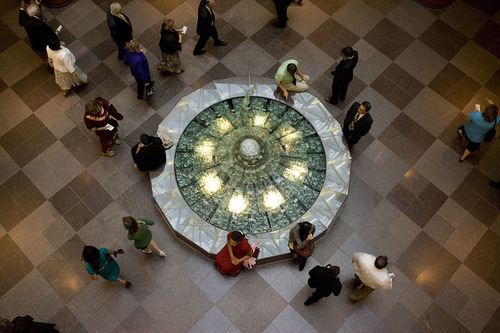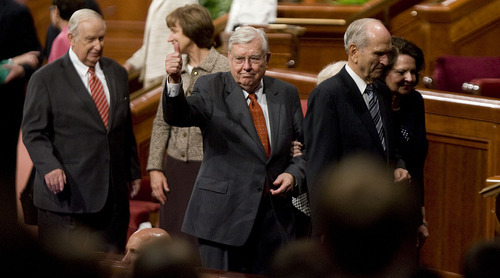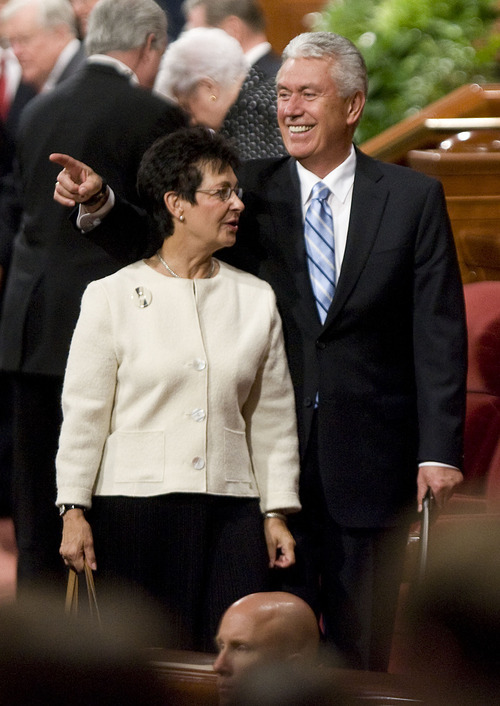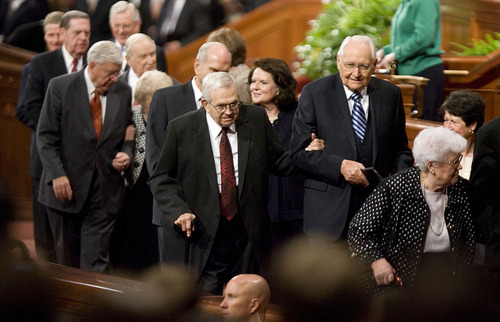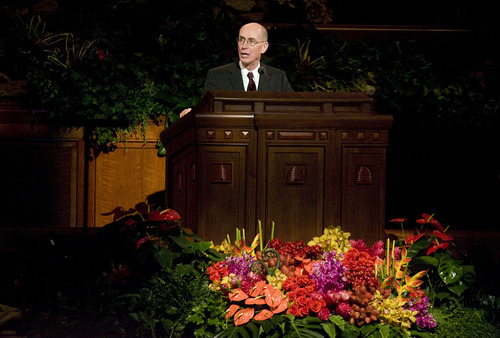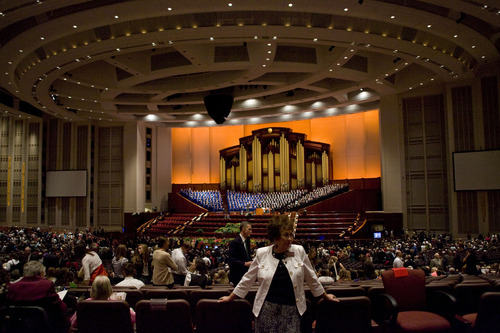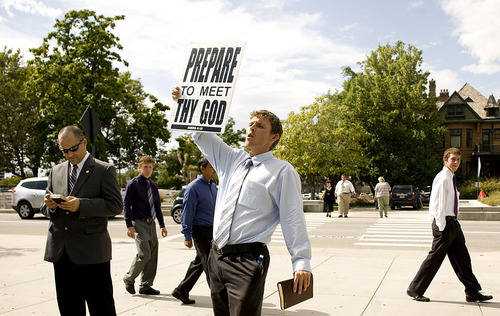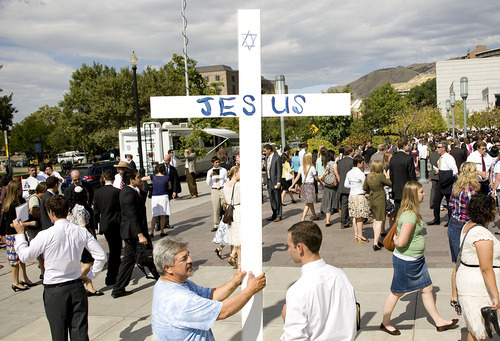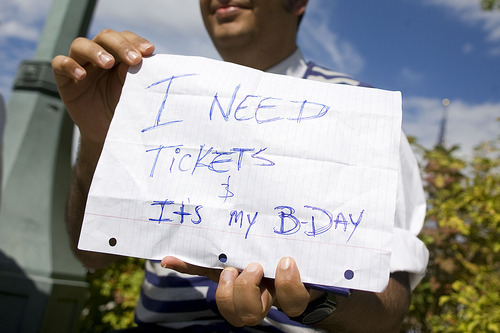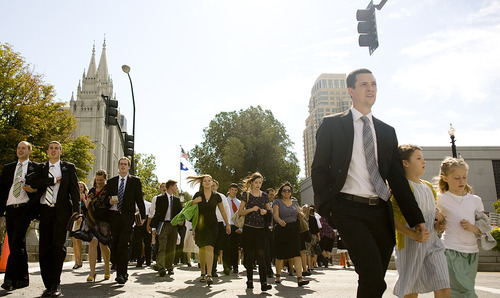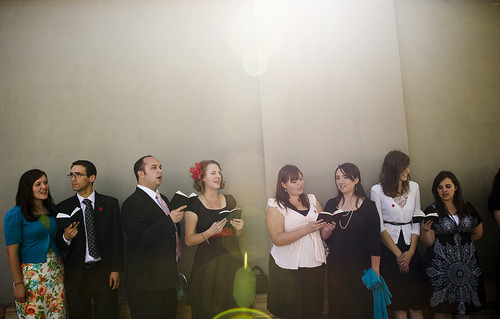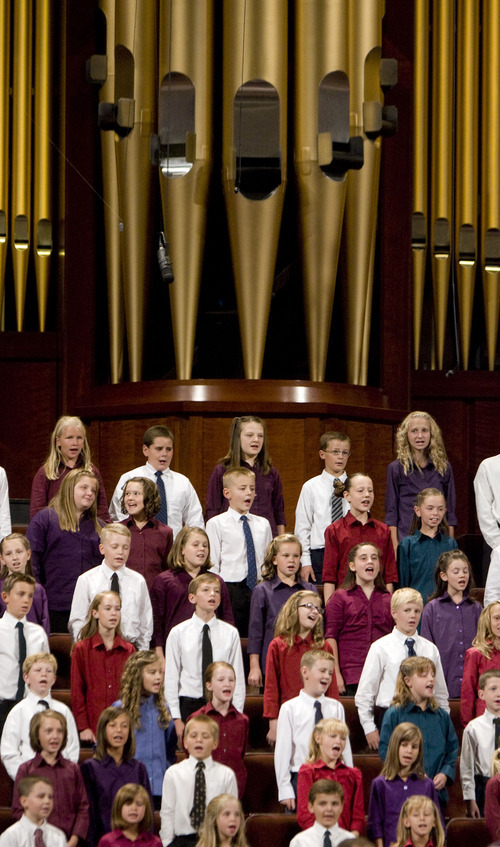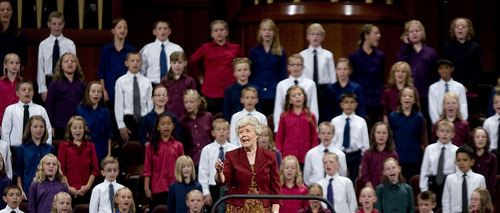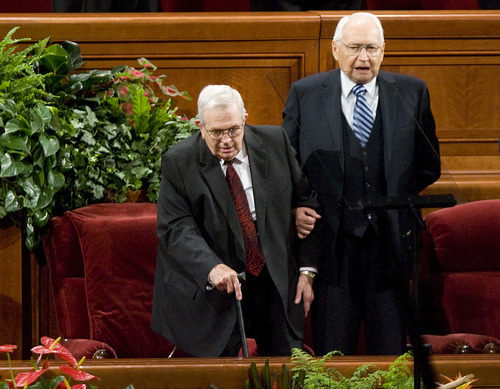This is an archived article that was published on sltrib.com in 2011, and information in the article may be outdated. It is provided only for personal research purposes and may not be reprinted.
The end is not near, senior LDS apostle Boyd K. Packer said Saturday.
Today's youths can look forward to "getting married, having a family, seeing your children and grandchildren, maybe even great-grandchildren," Packer told more than 20,000 Mormons gathered in the giant LDS Conference Center in downtown Salt Lake City.
His speech came during the opening session of the 181st Semiannual General Conference of The Church of Jesus Christ of Latter-day Saints, with millions watching via satellite and on the Internet.
LDS President Thomas S. Monson was not in his seat as the conference began but arrived about midway due to "a delay en route," a church spokesman said.
Monson then offered his traditional welcome and announced five new temples: a restored Provo Tabernacle converted into a second temple in that Utah County hub; Star Valley, Wyo; Kinshasa, Democratic Republic of Congo; Durban, South Africa; and Barranquilla, Colombia. Work is moving forward in France on the Paris temple as well.
"Hello," Monson quipped to laughter from the surprised audience. "I wondered who I should call to substitute for me?"
Later in the morning, Packer, in his 100th address as an LDS general authority, said fears of a looming apocalypse are understandable, given society's declining morals and ever-present temptations to sin.
The 87-year-old apostle vividly recalls his own fears for the future.
When he was 17, the Japanese launched a surprise attack on Pearl Harbor. Within a short time, the U.S. declared war on that Asian nation and joined the battles in Europe. He and many other religious young people thought perhaps this might be the end of the world prophesied in scripture.
"All at once our future was uncertain. We did not know what was ahead," said Packer, who delivered his sermon while sitting in his seat. "Would we live to get married and have a family?"
These days, young Mormons may have similar anxiety about the future, Packer said, quoting them as saying, "The end of the world is going to come before I get to where I should be."
To that, Packer declared, "Not so!"
He assured the youths that if they follow Mormon teachings and live its principles, they will be "watched over and protected."
These days, Mormons are more visible in the world and media than ever, LDS apostle L. Tom Perry said in the afternoon session, but there is still much misinformation about the church and its teachings.
Perry, who oversees the church's Public Affairs department, urged members to take advantage of this "Mormon moment."
They should, he said, "be bold in [their] declarations of Jesus Christ," be a "righteous example" to the faith and its principles, and speak up about the church when asked.
"Your associates are not inviting you to teach, preach, expound and exhort," Perry said. "Engage them in a two-way conversation — share something about your religious beliefs, but also ask them about their beliefs."
He cautioned them to use a respectful, civil tone and avoid becoming defensive.
"In speaking about the church, we do not try to make it sound better than it is. We do not need to spin our message," he said. "We need to communicate the message honestly and directly."
If church members do that, Perry said, "suspicions will evaporate, negative stereotypes will disappear, and [outsiders] will understand the [LDS] Church as it really is."
Dieter F. Uchtdorf, second counselor in the faith's governing First Presidency, discussed what he called the "paradox of man," that "compared to God, man is nothing, yet we are everything to God."
Against a "backdrop of infinite creation," humanity may appear small and insignificant, Uchtdorf said, but "we have a spark of eternal fire ... [and] the incomprehensible promise of exaltation ... within our grasp. And it is God's great desire to help us reach it."
People are often pulled toward one or the other extreme, he said. Either they believe "the fantasy of their own self-importance and invincibility," or they focus so much on their insignificance that they doubt their self-worth.
Uchtdorf, a former airline pilot who was born in Czechoslovakia and raised in East Germany, acknowledged that he, too, has had moments where he felt "insignificant, unknown and quite alone." But, he said, he never felt abandoned by God. He felt lifted up by his Mormon beliefs.
God doesn't recognize rank, wealth, achievement or church position, Uchtdorf said. "The Lord doesn't care if we spend our time working in marble halls or stable stalls."
No matter who you are, he assured the LDS faithful, "the most powerful being in the universe is the father of your spirit. He knows you. He loves you with perfect love."
Barbara Thompson also spoke about connecting to deity through desire and openness.
"We must not harden our hearts," said Thompson, second counselor in the General Relief Society, the church's women's organization. "We need to ask in faith."
But that doesn't guarantee inspiration will come in a predictable pattern, Thompson said. "Answers will come in the Lord's way and in his time."
That theme was echoed in a speech by apostle Neil L. Andersen, who discussed the importance of having children in obedience to God's commandment to Adam and Eve to "be fruitful and multiply."
But the number and timing of children, Andersen said, "are private decisions to be made by a husband and wife and the Lord."
Other new temples — from Africa to Wyoming
After Mike Headlee heard LDS President Thomas S. Monson announce Saturday that the church's Provo Tabernacle would be restored and converted into a temple, the former mission president had a strong feeling about what was coming next: a temple in Kinshasa, capital of the Democratic Republic of Congo.
He was right.
Headlee, who supervised Mormon missionaries in Kinshasa until July, didn't have any inside information, he said. He merely felt the LDS Church there "is so strong and growing," it was the perfect place for the church's first temple in the center of the African continent.
"Having a temple will be one more thing that will really enthuse the members even more," Headlee said. "They are already very devoted, with nine stakes [a group of congregations] and growing rapidly. Sacrament meeting attendance is nearly 80 percent and retention [of converts] is as high as anywhere in the world."
In addition to the Congo temple, Monson said the Utah-based faith will also build one in Durban, South Africa, nearly doubling the number of such sacred LDS structures on that continent from three (Johannesburg, South Africa; Accra, Ghana; and Aba, Nigeria) to five.
Building one in Kinshasa will make it much easier for Mormons in that country as well as in neighboring countries — Kenya, Tanzania, Uganda, Ethiopia, Rwanda and Burundi — to participate in temple worship. Before this, the nearest temple was in Ghana, hundreds of miles and an expensive airplane ride away.
"The tears are flowing," Edward Christensen, former mission president in the Uganda Kampala Mission, wrote in an email. "These announcements will give hope and purpose to the saints in East Africa to prepare for their own temple."
Christensen also celebrated the temple in Durban.
"I imagine that other countries in southeast Africa will be part of that temple district," he said. "We sometimes had difficulty scheduling our trips to Johannesburg due to high usage, so I know that the temples will be busy."
Monson also announced new temples in Barranquilla, Colombia, and Star Valley, Wyo. Work is moving forward in France on the Paris temple as well, he said.
Commenting on the Wyoming temple, Monson said, "I think I'll dedicate that one," adding, "There's good fishing up there."
Peggy Fletcher Stack


